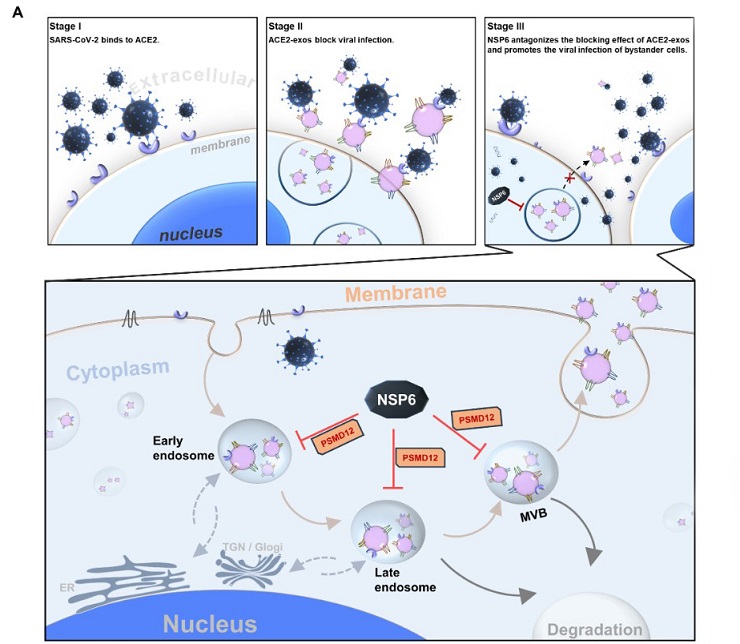COVID-19 News: SARS-CoV-2 Nsp6 Inhibits Production Of ACE2-Containing Exosomes To Promote Infectivity!
Nikhil Prasad Fact checked by:Thailand Medical News Team Feb 04, 2024 1 year, 2 months, 1 week, 4 days, 18 hours, 58 minutes ago
COVID-19 News: The global battle against the COVID-19 pandemic rages on as scientists delve deeper into understanding the intricate workings of the SARS-CoV-2 virus. Among the many mysteries surrounding this novel coronavirus, one area of intense research focus is its interaction with host cells, particularly regarding the role of angiotensin-converting enzyme 2-containing exosomes (ACE2-exos) in viral infectivity. Collaborative efforts between researchers from esteemed institutions such as the South China University of Technology, Southern Medical University-China, Sun Yat-sen University, and the Second Affiliated Hospital of Guangzhou Medical University-China have yielded groundbreaking insights that are covered in this
COVID-19 News report, into how SARS-CoV-2 subverts host defenses through its nonstructural protein 6 (NSP6), ultimately promoting viral infectivity.
 Schematic of NSP6 hijacking the biogenesis of ACE2-exos.
Schematic of NSP6 hijacking the biogenesis of ACE2-exos.
(A) SARS-CoV-2 infected host cells mainly by binding to ACE2 on the cell surface (stage I). Upon SARS-CoV-2 infection, ACE2-containing exosomes (ACE2-exos) could be induced to bind to free virions and avoid susceptible bystander cells being infected (stage II). NSP6 inhibited the production of ACE2-exos and facilitated viral infection to adjacent cells (stage III). CD63 was involved in all the biogenesis stages of exosomes, including early endosome (EE) formation, later endosome (LE) maturation, multivesicular body (MVB) formation, and exosome secretion. CD63 positively regulated the production of ACE2-exos. While in SARS-CoV-2-infected cells, viral protein NSP6 promoted CD63 degradation within EE, LE, and MVB throughout the endocytic pathway by enhancing its ubiquitination, thereby inhibiting the production of total exosomes as well as ACE2-exos. PSMD12 was involved in maintaining the homeostasis of CD63 and ACE2, which was hijacked and antagonized by NSP6. The inhibition of the production of ACE2-exos by NSP6 eventually promoted free virions to infect healthy bystander cells.
Delving into SARS-CoV-2 Biology
SARS-CoV-2, classified as a beta-coronavirus, boasts a complex structure comprising various structural and nonstructural proteins. Key among these proteins is NSP6, a multi-transmembrane protein crucial for viral replication, assembly, and modulation of host cell processes. Mutations within NSP6 have been linked to alterations in viral transmissibility and pathogenicity, underscoring its significance in the SARS-CoV-2 lifecycle.
Understanding Exosomes and ACE2
Exosomes, a subtype of extracellular vesicles, play pivotal roles in intercellular communication, carrying cargo such as proteins, lipids, and nucleic acids. Of particular interest is ACE2, the cellular receptor through which SARS-CoV-2 gains entry into host cells. ACE2 is not only present on the cell surface but also packaged within exosomes. ACE2-exos have emerged as potent defenders against SARS-CoV-2 infection, acting as decoys to inter
cept viral particles and neutralize their infectivity.
The Crucial Role of ACE2-Exos in Antiviral Defense
Research has illuminated the remarkable antiviral efficacy of ACE2-exos, with studies demonstrating their ability to neutralize SARS-CoV-2 virions and mitigate infection. Clinical observations have further underscored the clinical significance of ACE2-exos, with higher levels correlating with improved patient outcomes and shorter hospitalization durations. Engineered exosomes expressing ACE2 show promise as potential therapeutic interventions against COVID-19, highlighting the therapeutic potential of harnessing exosome-based therapies in combating viral infections.
NSP6-Mediated Inhibition of ACE2-Exos
The collaborative study identified NSP6 as a key player in the SARS-CoV-2 strategy to counteract host defenses. Through a series of meticulously designed experiments, the researchers elucidated how NSP6 inhibits the production of ACE2-exos, thus undermining the host's natural antiviral defenses. NSP6 achieves this by disrupting the protein levels of both ACE2 and CD63, a critical factor in exosome biogenesis. By interacting with the proteasome 26S subunit, non-ATPase 12 (PSMD12), NSP6 impedes the deubiquitination process essential for maintaining the stability of CD63 and ACE2, leading to their degradation and ultimately diminishing the antiviral efficacy of ACE2-exos.
Mechanistic Insights and Therapeutic Implications
The study's findings provide invaluable mechanistic insights into the complex interplay between SARS-CoV-2 and host cells, paving the way for the development of targeted therapeutic interventions. By targeting NSP6, researchers may unlock novel avenues for enhancing the effectiveness of ACE2-exos in combating COVID-19. Moreover, understanding the intricate mechanisms of viral evasion elucidated by this study offers crucial knowledge for the development of future antiviral strategies.
Exploring Future Directions
While the study represents a significant milestone in unraveling the intricacies of SARS-CoV-2 pathogenesis, several avenues for future research merit exploration. Further elucidating the precise mechanisms by which NSP6 interacts with host proteins involved in exosome biogenesis could uncover additional targets for therapeutic intervention. Additionally, authentic SARS-CoV-2 infection studies are warranted to validate the findings obtained with pseudotyped variants, ensuring their relevance and applicability in clinical settings.
Conclusion
In conclusion, the collaborative study sheds light on the sophisticated strategies employed by SARS-CoV-2 to evade host immune surveillance and promote viral infectivity. By elucidating the role of NSP6 in inhibiting ACE2-exos production, the researchers have identified a promising target for therapeutic intervention. As the scientific community continues to unravel the complexities of COVID-19 pathogenesis, understanding the virus-host interaction at this level of detail offers invaluable insights for the development of effective antiviral strategies. With concerted efforts and ongoing research, we stand poised to overcome the challenges posed by the COVID-19 pandemic and emerge stronger in our fight against infectious diseases.
The study findings were published in the peer reviewed journal: mBio
https://journals.asm.org/doi/10.1128/mbio.03358-23
For the latest
COVID-19 News, keep on logging to Thailand Medical News.
